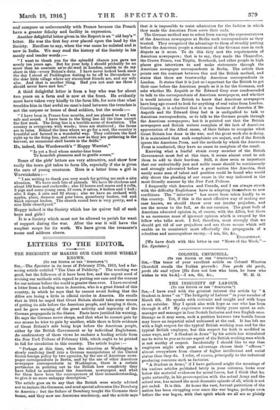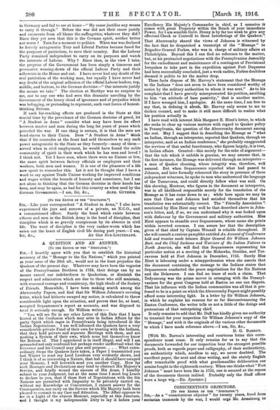THE INDIGNITY OF LAB OUR.
[To THE EDITOR OP THE "SPROTATOR.1
Sra,—I have read with the greatest interest the article by " A Student in Arms " on " The Indignity of Labour " in your number of March 4th. He speaks with restraint and insight and with hope as an outsider. May I speak also with hope as one who has been through it all t My experience covers thirty years spent as sub- manager and manager in four Scotch factories and two English ones. Strange as it may seem, such a position between two hostile forces may leave an impartial mind unbiassed at the end. It has left me with a high respect for the typical British working man and for the typical British employer, but this respect for both is modified in ROM ways, and " A Student in Arnie " by his article has stimulated me to write to you as to one aspect of the British working man which is not worthy of respect. Incidentally I should like to say that employers might with great advantage choose their " officers " almost everywhere from classes of higher intellectual and social status than they do. I refer, of course, principally to the industrial producing concerns such as factories.
" A Student in Arms," if I have gathered aright the meanings of his various articles published lately in your columns, looks ever below the material evidences for moral forces, but I think that he, quite naturally, in his preoccupation with tho actual Army and the actual war, has missed the most dramatic episode of all, which is not yet ended. It is this. At home the vast, fervent patriotism of the nation has been struggling over since the war began, perhaps oven before the war began, with that spirit which we all see so plainly in Germany and fail to see at home—" My cause justifies any means to carry it through." Before the war did not their cause justify and exonerate from all blame the suffragettes, whatever they did ? Have they yet seen that this is the German spirit, neither better nor worse 1 Turn for a moment to politics. When war was declared be fiercely antagonistic Tory and Liberal Parties became fused for the purposes of patriotism, to save their country. But the Labour Party remained independent to carry on its purposes and watch the interests of Labour. Why ? Since then, in the view I take, the progress of the Government has been simply a timorous and persuasive wearing-down of the official Labour Party and their adherents in the House and out. I have never had any doubt of the real patriotism of the working man, but equally I have never had any doubt of the original adhesion of the official Labour leaders, top, middle, and-bottom, to the German doctrine—" Our interests justify the means we take." The election at Merthyr was no surprise to me, nor to any one who had seen this dramatio unrolling by the Government of the heavy cloud of ignorance and of prejudice which was befogging, or pretending to represent, such vast forces of honest- thinking Britons.
If such far-reaching effects are produced in the State at this crucial time by the prevalence of the German doctrine of greed, let " A Student in Arms " consider what may have been its effect between master and man during the long fat years of peace which preceded the war. If one thing is certain, it is that the men are bond-slaves to their Union. Does " A Student in Arms " think that if his comrades at the front had sold themselves to any such power antagonistic to the State as they formerly—many of them— served when in civil employment, he would have found the noble community of spirit in their work which he has seen and loved ? I think not. Yet I have seen, where there were no Unions or few, the same spirit between factory officials or employers and their workers, both men and women. It is one of the pleasures of a life now spent to remember this. Let it not be thought that I have a word to say against Trade Unions working for improved conditions and wages within the bounds of honesty and conscience, but I am not alone in thinking that the German doctrine in their hands has been, and may be again, as bad for this country as when used by the
German Government.—I am, Sir, &c., ALEX. GIrruars.



































 Previous page
Previous page